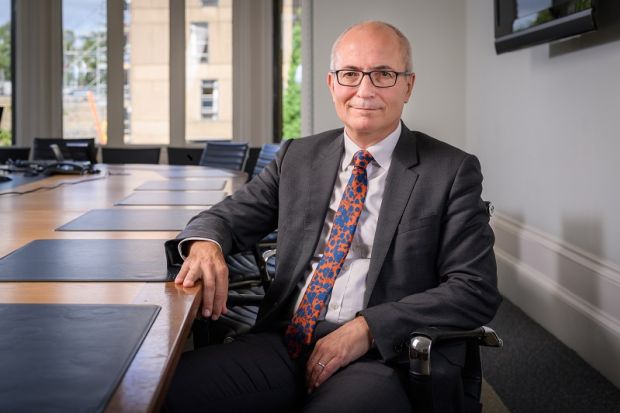Professor Jeffery will be speaking at THE Campus Live on 24 November as part of a panel on how universities can emerge from the Covid-19 pandemic stronger than ever. The event will also include a workshop on collaborating for civic engagement. Register here.
When Charlie Jeffery became the vice-chancellor and president of the University of York in September 2019 one of the first things he did was bury himself in the archives. Investigating the circumstances of the university’s founding, he discovered a unique origin story.
Now he is using the values he believes shaped York’s beginnings and updating them for the modern era.
“I think you have to get to know the soul of the place,” says Jeffery, who was previously senior vice-principal at the University of Edinburgh. In his quest to do so at York he found values that he believes mark the university out as civic-minded, international and passionate about equality and community.
Finding the soul
The university was set up by a group of people linked to the Joseph Rowntree trusts and family. As Quakers, they implemented socially conscious ideals in their work, and founded the university in that spirit.
One document Jeffery found in the archive that was used in the negotiations with the University Grants Council over whether to establish the university, stated, “we want the university to be one that conducts studies that contribute to the amelioration of human life and conditions.”
“What a statement that is!” Jeffery says. “We want what you do to make society better.”
While York wasn’t founded as a social science university – it focused on biology, chemistry and physics – “the core thinking of the university at the outset was social science thinking,” he says.
Jeffery was particularly struck by a statement from Lord James of Rusholme, the university’s first vice-chancellor. James was a proponent of widening access to higher education, saying “we should care about that more than almost anything else”. He wrote to every school in the country announcing that York was looking for talented young students and when the first cohort started in 1963 it included two students from one of the poorest areas of London, a stay-at-home mother, a man in his sixties and a woman who used a wheelchair.
Another value is embodied by a statement from the founding ceremony. “The aspiration was set that ‘University of York students should be citizens of the world.’ That language! ‘Citizens of the world.’ In 1963!”
Jeffery believes the founding values have prompted a stronger sense of community at York than exists at other universities. But he says that the values had worn away somewhat since the 1960s.
“It had also lost its definition a little bit. It was there in the ether, but it wasn’t as self-evident in those terms. So, one thing I thought I would do would be just to play these founding ideas back to the university.”
Identifying the mission
Jeffery began a tour of 36 university departments, recapitulating what he’d found about the university’s values, and listening to feedback on the institution more broadly. At each meeting he presented his ideas for about 10 minutes, then said to staff, “What do you want the university to be?”
Staff felt that the values he had identified resonated, he says, and they discussed practical ways they could apply them today.
York’s mission statement became “The University of York exists for public good,” and principles developed: they would focus on action-oriented research, widening access, strengthening the surrounding area, and working internationally. Jeffery is now incorporating those principles into the strategy that will guide the university through to 2030.
But why was it necessary to reflect on the values at all? Why not go straight to the strategy?
The values mobilise and they inspire, Jeffery says. “They bring people together in common purpose. We’ve summarised it in the very stark phrase ‘The University of York exists for public good’. That's so resonant for people at the university to see, so resonant for people coming to the university,” he adds.
“We’re appointing people who are saying, ‘Yeah, I read about that. It’s great. I want to come now; I want to be part of that.’”
Some might argue that every university could state that it exists for the public good, but Jeffery suggests that this belies reality: “Yeah, they could but they don’t. If you do, and you say why you do, then that really is distinctive. But it’s also about what you do with it.”
New directions
Jeffery says he found it “a little bit ironic” that “a university which had such a strong civic prompt – and it was about the context of the 1960s – saw itself as a national university, not a local” one.
“It didn’t actually do a lot of reflecting back of that inspiration into the city and the community and the region around York,” he says.
Now he wants York to be a convener of coalitions that can boost the local economy. One project the institution has already started is called Bio Yorkshire. It brings together the university, a research lab and a further education college to commercialise York’s cutting-edge research in the bioeconomy and create local jobs.
This is also an important message to government, he says, to emphasise the value that universities bring.
“If all universities were really thinking in that way, and we had 150 local stories of extraordinary value in supporting and developing the economy and supporting and developing the combatting of disadvantage in bringing together powerful coalitions then perhaps government might think differently about universities,” he says.
Using the new institutional values to guide decision-making will also help with organisational changes, Jeffery says. For example, one area York will expand in order to be a university for the public good is the environment. He found on his tour of departments that organisational inefficiencies were hindering the interdisciplinary teaching needed to create the climate problem-solvers of the future. Departments assigned varying amounts of credits to modules, which made it difficult for students to take courses across subjects, such as environmental science and law.
To combat this, York is assigning 20 credits to every module across the university, starting in 2023.
“Organisational change is disruptive, and people get a bit annoyed by it,” Jeffery says, but they are more agreeable when it is presented as linked to aims with values behind them rather than for efficiency or cost reasons.
Another initiative to come out of their focus on the environment is an architecture and built environment department, something the university hasn’t had before. Jeffery says there is an advantage to establishing such a department from scratch now.
“It will jump straight in at that point where everything has to be carbon neutral, not just in the operation of the building, but in the whole life of the building from the things you use to build it and how you renovate it, and ultimately demolish it,” he says.

Towards diversity
Considering the public good has also ramped up York’s focus on diversity. The institution aims to recruit a new generation of early career researchers with two criteria: brilliant minds and under-represented backgrounds. Once it has recruited the new academics it will put them through a concentrated training programme so that they “become some of our most innovative teachers”, Jeffery says.
As the son of a single mother who relied on benefits, and the only one of his primary school class to go to university, widening access is especially important to Jeffery. “We had some tough years,” he says. “Happily, my mum gave me an interest in learning. And I had a good headteacher who spotted potential.”
Now, York is working with a charity that helps children from disadvantaged areas access university, bearing out that original statement of access being more important than "almost anything else".
Measuring success
Implementing a values-driven strategy is one thing, but how do you measure its success? York is in the process of setting key performance indicators (KPIs) and Jeffery says they are thinking creatively.
“Some of them will be straightforward indicators around student education and research that everybody uses. Some of the things that we’re trying to do will be harder to capture in that way,” he admits.
“[For example] a modernised version of the 1963 ‘citizens of the world’. So, what is internationalism? I’d hate to think that that would just be about the numbers of international students, that’s not internationalism. So, it’s got to be something which would be a bit more qualitative about the kinds of relationships that you can establish.”
Similarly, when it comes to widening access to university for local people, the goal would be that students from disadvantaged backgrounds in York and the surrounding area attend any university, not just York, so a KPI would have to measure that.
“I’d like us to be more sophisticated and subtle in understanding those indirect impacts,” he says.
When it comes to management style, Jeffery says something he believes is important is meeting people in their own settings rather than expecting them to come to him, because it helps build trust.
“You’ve got to understand the work that people do if you want to help shape that into a collective purpose.”
Quick facts
Born: Holcot in Northamptonshire, England, 1964
Leadership positions: Vice-chancellor and president at the University of York; senior vice-principal and vice-principal (public policy) at the University of Edinburgh.
Academic qualifications: BA and PhD in European studies, both from Loughborough University
Lives with: His wife and two children; a third child is at university
Academic hero: William Paterson, emeritus professor in politics and international relations. “He was a very, very important mentor at a crucial point in my career. I learned a lot from him about how to write as an academic: very straightforwardly.”
This is part of our “Talking leadership” series of 50 interviews over 50 weeks with the people running the world’s top universities about how they solve common strategic issues and implement change. Follow the series here.
Register to continue
Why register?
- Registration is free and only takes a moment
- Once registered, you can read 3 articles a month
- Sign up for our newsletter
Subscribe
Or subscribe for unlimited access to:
- Unlimited access to news, views, insights & reviews
- Digital editions
- Digital access to THE’s university and college rankings analysis
Already registered or a current subscriber? Login








